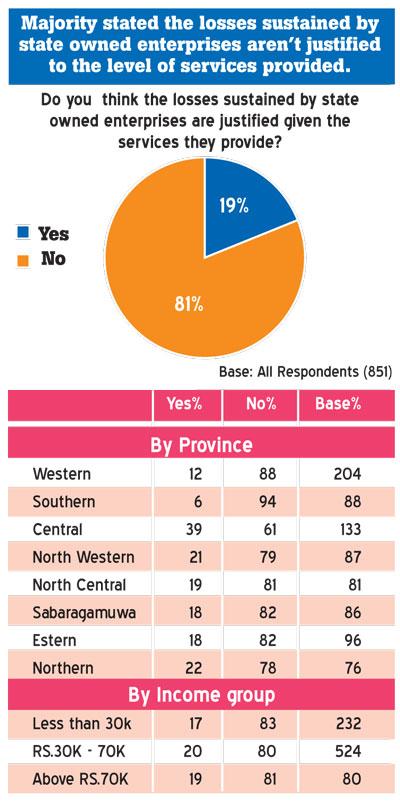13 Dec 2019 - {{hitsCtrl.values.hits}}
About 81 percent of Sri Lankans believe that the losses sustained by State-owned enterprises (SOEs) are not justified, compared to the services they provide, according to a public opinion poll conducted by Colombo-based think tank, Advocata Institute.

The poll found no significant differences among income, gender or socio-economic groups. However, the respondents from the Central Province were more likely to believe that the services provided justified losses, with 39 percent holding this opinion.
The respondents from the Southern and Western Provinces were least likely to believe that the services justified losses, with only 6 percent from the Southern Province and 12 percent from the Western Province saying the losses were justified.
Advocata conducted the face-to-face interviews by visiting door-to-door covering 18 districts in eight provinces and responses recorded in tab/mobile devices. According to the third report of the Committee of Public Enterprises (COPE), the 18 SOEs, of which financial statements were investigated in the report, made a net loss in 2018 amounting to
Rs. 61 billion.
The report highlighted that the Ceylon Petroleum Corporation (CPC) alone made an enormous loss of Rs.105 billion in 2018, while the National Water Supply and Drainage Board (NWSDB) incurred a loss of Rs.505 million, and Elkaduwa Plantation Ltd., incurred a loss of Rs.33 million.
Of the 23 institutions examined, five were found to have incurred annual losses of over Rs.2 million, while another five did not have end-of-the-year financial statements to present.
Advocata Institute’s ‘The State of State Enterprises in Sri Lanka – 2019’ report highlighted that SOEs are vulnerable to mismanagement and corruption because of potential conflicts between the ownership and policy-making functions of the government, and undue political influence on their policies, appointments, and business practices.
The report recommended that the government should actively engage in strengthening SOEs and their service delivery by compiling a comprehensive list of all SOEs, setting basic reporting procedures and implementing internationally accepted principles of corporate governance.
22 Dec 2024 4 hours ago
22 Dec 2024 5 hours ago
22 Dec 2024 5 hours ago
22 Dec 2024 8 hours ago
22 Dec 2024 8 hours ago